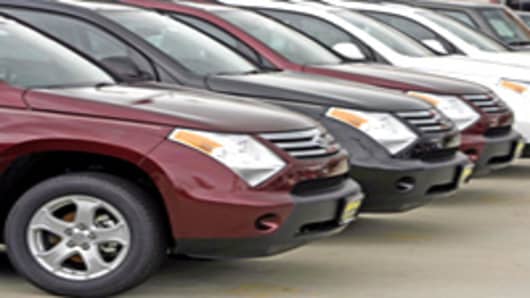U.S. subprime auto lenders say they do not see a rising wave of defaults, but over the past year they have made a number of moves to burnish the scratches and dents in their loan portfolios.
Triad Financial, partly owned by Goldman Sachs Group, recently disclosed that 21.4 percent of the loans in its portfolio have been granted payment extensions to help borrowers experiencing financial troubles. That's an 88 percent increase over the level reported at the end of June 2006.
The company did not return calls seeking comment.
Payment extensions are a fact of life in the $300-billion-a-year industry, giving companies a better chance at collecting more money over the life of a loan.
In recent weeks, shares of U.S. subprime auto lenders have been hammered as investors link them with the meltdown in the subprime mortgage industry.
"It's guilt by association," said Chris Choate, chief financial officer of AmeriCredit, one of the largest independent U.S. subprime auto lenders.
AmeriCredit competes against bigger and more diversified lenders, including Capital One Financial, HSBC Holdings' U.S. consumer unit, Wachovia, Citigroup, JPMorgan Chase and Wells Fargo.
Over the past few years, the large banks expanded operations, giving auto loans to people with weak credit to capture bigger profit margins. The seven largest players control about 40 percent of the market. They also push loans of 60 months or more, creating a greater credit risk.
The portion of those longer-term loans more than doubled between 2002 and last year to 68 percent, according to subprime loan pools rated by Standard & Poor's.
"History has shown that the longer the term, the higher the net loss on the loan," Standard & Poor's credit analysts said.
Choate disagrees with that assessment.
"As long as economic conditions and job markets remain stable, consumers will continue to make car payments to get back and forth to work," he said.
"Confident"
He also said he expects that AmeriCredit can continue to fund auto loans without disruption. AmeriCredit holds more than $900 million in cash while delinquencies and credit losses have fallen slightly from last year.
"We do remain confident in our ability to access the securitization market in the fall," Choate said. With the acquisition of two lenders who cater to borrowers with better credit than AmeriCredit's core customer, the company reduced its credit volatility.
Like their mortgage brethren, subprime auto lenders package pools of loans into securities that are sold to investors. They also rely on credit lines funded by the same Wall Street banks that choked off funds to mortgage lenders.
If those funding avenues dry up or disappear, subprime auto lenders would take a big hit.
Goldman Sachs analyst James Fotheringham last week slapped a "sell" rating on shares of AmeriCredit, citing funding and credit concerns.
"The auto loan securitization market is only partially open for business. ... Investor demand for subprime assets remains uncertain," Fotheringham said in his research note.
At the end of June, Goldman Sachs Asset Management was AmeriCredit's largest shareholder with nearly 15 million shares, or about 13 percent of the company's stock.
AmeriCredit Chairman Clifton Morris Jr. responded to the downgrade by buying $2.85 million worth of his company's stock, which is down 34 percent this year.
Sean Egan, managing director of independent credit rating firm Egan-Jones Ratings Co., said he is skeptical subprime auto lenders will be able to avoid the pitfalls experienced by the subprime mortgage industry.
"We don't believe the subprime problem is limited to the mortgage sector," Egan said. "If people can't pay their mortgages, it's highly likely they won't be able to pay other bills, including auto (loans)."


